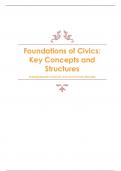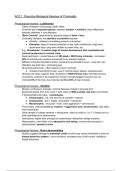Thesis
Foundations of Civics: Key Concepts and Structures
- Institution
- Abacus College, Oxford
This title encapsulates the comprehensive coverage of fundamental civics concepts, government structures, political theories, electoral systems, public policies, rights and responsibilities, international relations, and legal principles that are essential for understanding the field of civics.
[Show more]





